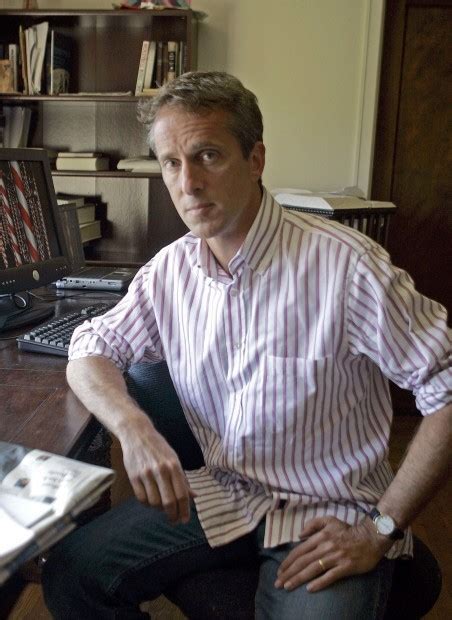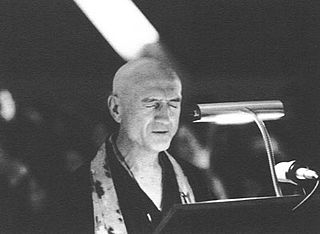A Quote by Alan Lightman
Most people have learned to live in the moment. The argument goes that if the past has uncertain effect on the present, there is no need to dwell on the past. And if the present has little effect on the future, present actions need not be weighed for their consequence. Rather, each act is an island in time, to be judged on its own. ... It is a world of impulse. It is a world of sincerity. It is a world in which every word spoken speaks just to that moment, every glance given has only one meaning.
Quote Topics
Act
Actions
Argument
Consequence
Dwell
Dwell On The Past
Each
Effect
Every
Future
Given
Glance
Goes
Impulse
Island
Judged
Just
Learned
Little
Live
Live In The Moment
Meaning
Moment
Most
Need
Only
Own
Past
People
Present
Rather
Sincerity
Speaks
Spoken
That Moment
Time
Uncertain
Weighed
Which
Word
World
Related Quotes
In the spiritual world there are no time divisions such as the past, present and future; for they have contracted themselves into a single moment of the present where life quivers in its true sense. The past and the future are both rolled up in this present moment of illumination, and this present moment is not something standing still with all its contents, for it ceaselessly moves on.
We human beings have enormous difficulty in focusing on the present; we always thinking about what we did, about how we could have done it better.... or else we think about the future, about what we're going to do.... But at this precise moment, you also realize that you can change your future by bringing the past into the present. Past and future only exist in our mind. The present moment, though, is outside of time, it's Eternity.... It isn't what you did in the past the will affect the present. It's what you do in the present that will redeem the past and thereby change the future.
But there's the rub. The present can never deliver one thing: meaning. The way of happiness and meaning are not the same. To find happiness, a man need only live in the moment; he need only live for the moment. But if he wants meaning--the meaning of his dreams, his secrets, his life--a man must reinhabit his past, however dark, and live for the future, however uncertain. Thus nature dangles happiness and meaning before us all, insisting only that we choose between them.
The present moment, though, is outside of time, it’s Eternity. In India they use the word “karma” for lack of any better term. But it’s a concept that’s rarely given a proper explanation. It isn’t what you did in the past that will affect the present. It’s what you do in the present that will redeem the past and thereby change the future.
When you don't flow freely with life in the present moment, it usually means that you're holding on to a past moment. It can be regret, sadness, hurt, fear, guilt, blame, anger, resentment, or sometimes even a desire for revenge. Each one of these states comes from a space of unforgiveness, a refusal to let go and come into the present moment. Only in the present moment can you create your future.
How often are you worrying about the present moment? The present moment is usually all right. If you're worrying, you're either agonizing over the past which you should have forgotten long ago, or else you're apprehensive over the future which hasn't even come yet. We tend to skip over the present moment which is the only moment God gives any of us to live.
To dwell in the here and now does not mean you never think about the past or responsibly plan for the future. The idea is simply not to allow yourself to get lost in regrets about the past or worries about the future. If you are firmly grounded in the present moment, the past can be an object of inquiry, the object of your mindfulness and concentration. You can attain many insights by looking into the past. But you are still grounded in the present moment.
To be reborn hourly and daily in this life, we need to die — to give of ourselves wholly to the demands of the moment, so that we utterly "disappear." Thoughts of past, present, or future, of life and death, of this world and the next, are transcended in the superabundance of the now. Time and timelessness coalesce: this is the moment of eternity.
We need to realize that we are observers and creators, and in every moment that we are observing our world, we're constantly remaking it at every instant, and that we have to understand too that every last thought we have, every judgment we hold, is having an effect whether it's conscious or not. So of course the most important thing of all is to be aware of what we are thinking and to realize it has an effect on the world around us.
When we let go of our battles and open our heart to things as they are, then we come to rest in the present moment. This is the beginning and the end of spiritual practice. Only in this moment can we discover that which is timeless. Only here can we find the love that we seek. Love in the past is simply memory, and love in the future is fantasy. Only in the reality of the present can we love, can we awaken, can we find peace and understanding and connection with ourselves and the world.



































